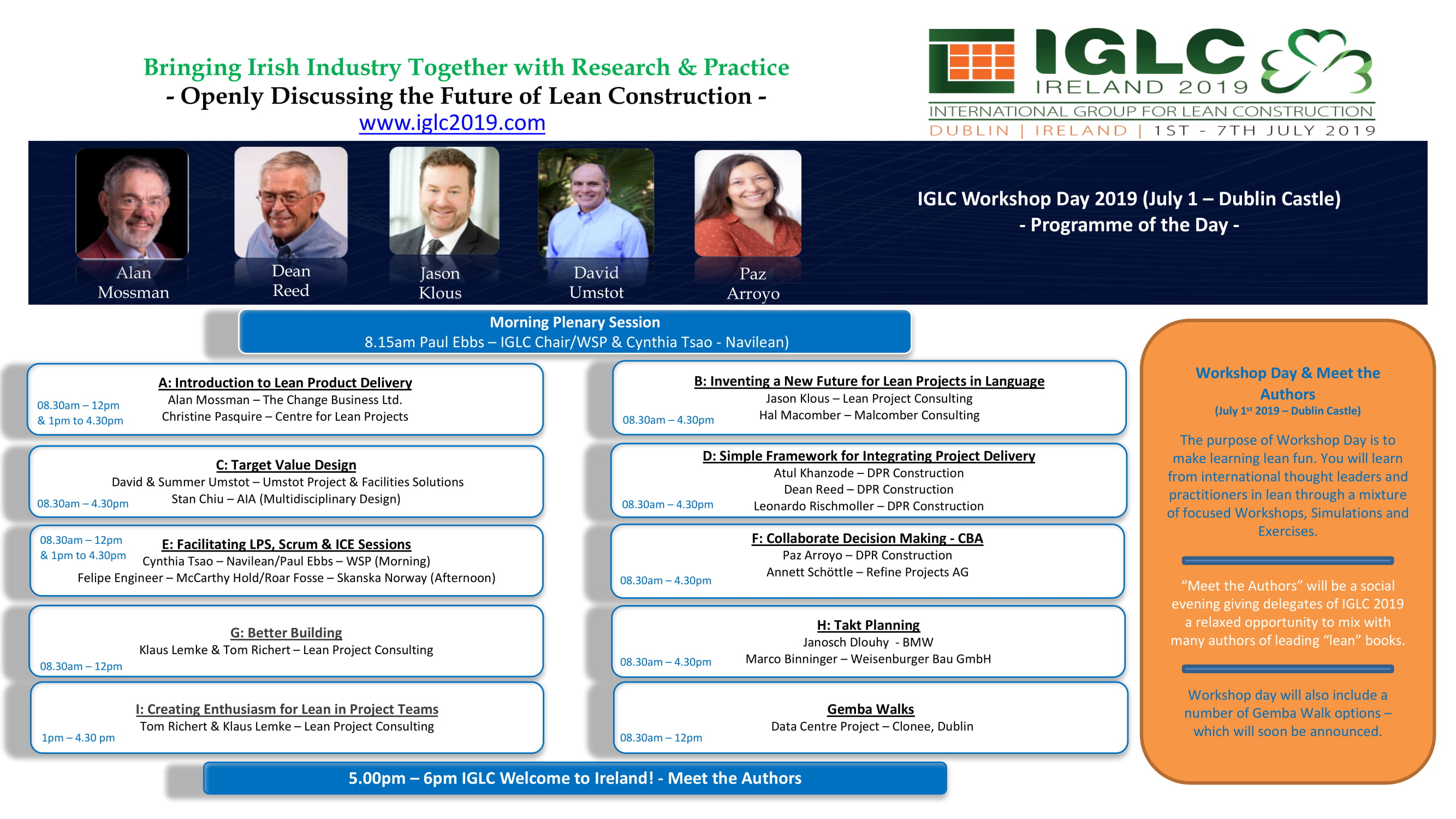1st July 2019 – Dublin Castle
The workshops will be facilitated by internationally recognised experts in Lean Project Delivery from the IGLC Community such as Cynthia Tsao, David Umstot, Hal Macomber, Jason Klous, Christine Pasquire, Alan Mossman, Dean Reed, Leonardo Rischmoller, Atul Khanzode, Paz Arroyo and Annett Schoettle. The workshops are aimed at beginner, intermediate and advanced levels for Owner Representatives, Designers, Construction Managers, Consultants/Trainers, Academics and Students. The workshops will use interactive and action based learning through a combination of simulations, exercises, discussions and short presentations.
_____________________________________________________________________________________________
Workshop A – Introduction to Lean Project Delivery
This 3.5 hour hands-on workshop will introduce the purpose and principles of lean thinking and lean construction. This workshop is aimed at practitioners and scholars who are starting out on their lean journey and who have never attended an introduction to lean construction. Based around three different simulations, this workshop will give you an experience of the power of lean thinking and get you thinking about lean principles and how you can apply them in your day-to-day work.
You will learn
- The purpose of lean thinking and a key pre-supposition
- Why construction is broken
- 7 key principles that underpin lean thinking.
The workshop might also be of interest to experienced lean practitioners who want to know how to use some simple simulations when they introduce lean construction. The simulations used will be ball game, a construction specific version of dot-card and magic stick.
Workshop facilitated by:
_____________________________________________________________________________________________
Workshop B – Inventing a New Future for Lean Projects in Language
In this workshop participants will learn how to invent new futures and possibilities for lean projects in a hands-on and interactive exploration of language and moods. The workshop will include a series of practical exercises you can use with your teams to build trust and a new future together. Language Action is one of the foundational building blocks of a lean project. Reliable promising and a network of commitments are just two of the concepts that are part of a foundation for any lean project or organization. In this workshop we will explore the deeper skills around Language Action and the transformational impact it has on individuals, projects and organizations. Participants will also learn the importance of moods and how they impact individual and team performance in the project environment. As part of the workshop you will learn how to recognize moods and cultivate new moods in your teams that lead to better project outcomes. At the end of the workshop participants will have learned new skills they can use in their teams.
Workshop Learning Objectives
- Participants in this workshop will learn the fundamental speech acts that make up Conversations for Action.
- Participants will learn the power of assessments and how they can open up new possibilities for inventing new practices on projects.
- Participants will learn how having more powerful conversations can build a new way of learning inside of teams.
- Participants will learn new skills to become navigators in the complex project environment.
- Participants will learn how moods shape and influence our possibilities for a new future and will develop new skills on how to shift moods on projects.
Workshop facilitated by:
_____________________________________________________________________________________________
Workshop C: Target Value Design
In this interactive hands-on workshop, participants will use a mock progressive design-build project to learn the specific steps in successfully implementing target value design. Target Value Design is a disciplined management practice that is used throughout project definition, design, detailing, construction, and commissioning to assure that the facilities meet the operational needs and values of the users, is delivered within the allowable budget, and promotes innovation throughout the process to increase value and eliminate waste. At the end of the workshop, participants will understand the parameters and have methods for structuring Target Value Design within their projects including “Project First” Thinking. Rather than optimizing the parts of the project, the participants must optimize the whole project. Our approach drives people to “Project First Thinking” tied to the defined values and True North for the project which enables project leaders to think in terms of the best “interests” of the project.
Workshop Learning Objectives
- Participants in this workshop will learn how to collaborate with design, trade and construction partners to enhance the value proposition on a project within a fixed budgetary constraint.
- Participants in this workshop will learn how to interactively coordinate real time pricing with design to meet project requirements within project constraints.
- Participants will recognize and understand the importance of early specialty trade involvement. They will understand the importance of continual cost estimating of projects to enable designers to more effectively make informed decisions communicate value adds to the end users.
- Participants will understand the parameters and methods for structuring TVD within their projects.
Workshop facilitated by:
_____________________________________________________________________________________________
Workshop D – A Simple Framework for Integrating Project Delivery (DPR Construction)
The workshop will focus on a new perspective on integrating project delivery in which the strategies for organization, work methods and processes, and information management are derived from the value created through design and construction of a valuable, high performing building. The workshop is based on the content of the book Integrating Project Delivery, published by John Willey & Sons on March 27, 2017. In the book, the authors explain how valuable, high performing buildings can be created using model they call, “A Simple Framework for Integrating Project Delivery.”
DPR Construction has published a brief, well-illustrated and written summary, titled A Guide to the Book Integrating Project Delivery. The Guide can be downloaded using this link:
https://www.dpr.com/view/a-guide-to-the-book-integrating-project-delivery
LEARNING OBJECTIVES
Participants will learn:
- The four criteria for a high performing building and how these define value.
- The four integrations required to deliver value.
- Why agreeing on rules of engagement and risk sharing are the foundation for real, rather than aspirational, integration.
- How teams can achieve the four integrations to support a Lean strategy through Virtual Design & Construction. This is nothing more, nor less, than using BIM collaboratively to manage design and production within a management framework of performance measurement to create rapid feedback for continuous learning and improvement.
Workshop facilitated by:
_____________________________________________________________________________________________
Workshop E – Learning, Teaching and Coaching Lean Project Delivery
Tired of un-engaging, inefficient meetings with unclear goals? Curious to learn how to integrate on-site crew into the design process? Interested in aligning design planning with their design sessions? Want to learn how experienced lean coaches facilitate different lean workshops and sessions? If the answer is yes to any of these questions join Paul Ebbs, Cynthia Tsao, Felipe Engineer and Roar Fosse at this workshop. They will share some of their lean training and facilitation methods on key concepts from the Last Planner® System, Scrum, Integrated Concurrent Engineering (ICE), BIM and Big Room. Participants will learn how these lean tools can be combined and used to improve project meeting outcomes. This hands-on interactive workshop is primarily designed for intermediate to advanced lean practitioners who are facilitators of workshops and project production sessions. Participants will learn through a mixture of short presentations, simulations, practical exercise, round table discussions and breakout sessions. The participants should be ready to take the ideas learned in the workshop and implement them with their project teams.
The participants will get practical takeaways and tips to use in their own workshops and sessions including guidance on how to plan, facilitate and record efficient LPS, Scrum and ICE sessions. The participants will receive templates and tools (such as Skanska’s ICE agenda, decision log, LPS plan check scorecard, facilitator handbook) and other tips and key manuals and facilitator checklists related to the LPS, Scrum and integrating digital technology into Big Room sessions.
Recommended Participant Reading
Morning workshop: (Phase Pull Planning and Make Ready Coaching)
Afternoon workshop: (Agile/Scrum and ICE/Big Room Coaching)
Workshop facilitated by:
_____________________________________________________________________________________________
Workshop F – Collaborative Decisions Using Choosing By Advantages
Choosing By Advantages (CBA) is a powerful system to make collaborative decisions for design and construction that aligns with lean thinking.
Projects teams have to make many decisions; waiting for the owner or architect to make them in isolation is not a wise strategy. Teams that systematically use CBA in a collaborative fashion significantly decrease negative design iterations, save time and money for the owner, and reduce team frustration. CBA helps teams align on what is relevant, understand why decisions were made on a project, and also find innovative design and construction solutions.
This workshop will provide the basis for CBA in AECFM projects. Through exercises we will discuss best practices to manage the decision-making process in design.
Learning outcomes:
- Understand the importance of decision-making methods.
- Learn the basics of CBA.
- Understand the difference between CBA and other decision-making methods.
- Explore the connection between Target Value Desgin/Delivery, Set-Based Design, A3 problem solving and CBA.
- Create a transparent rationale for group decisions.
Workshop facilitated by:
_____________________________________________________________________________________________
Workshop G – Better Building: Lean Practice for the Project-Driven Organisation
Lean Thinking has proven effective in many industries including design and construction. Yet, many leaders and organisations struggle to achieve the full promise of lean and integrate new thinking and behaviours into their project-based work.
We know that project work has unique challenges and opportunities when compared to steady-state lean operations such as manufacturing. Project-driven organisations struggle with the temporary nature of their teams, the unique “one-off” nature of their projects, and their inability to effectively lead a group with competing objectives, loyalties and motivations.
Built on the popular book by the same title, this interactive workshop presents a set of six core lean practices specifically adapted for application to the environment of project work. You will be introduced to the Better Building model and experience some of the practices yourself in this interactive workshop. More information about the book and Better Building model can be found here: https://www.leanproject.com/publishing/better-building/
Participants will learn:
- Why lean practices struggle to take root in design and construction.
- How project-driven organisations have different needs than steady-state operations.
- Six core practices for making lean effective in this environment.
- How adopting new practices can shift your personal thinking and organisations culture.
Workshop facilitated by:
_____________________________________________________________________________________________
Workshop H – Takt Planning
Planning and Steering Construction Projects using Takt
Takt Planning is increasingly being used on lean construction projects to improve the predictability of work. It is often used in combination with other lean methods. Takt is not a tool to push and control workers. It is a three dimensional technique that supports highly efficient coordination through effective collaboration. Takt is the beat of construction (like in music or dance) that coordinates and triggers action.
To date, the workshop facilitators have completed more than 200 construction projects using Takt Planning for BMW and Weisenburger Bau (a German Main Contracting firm). The primary aim of this hands-on interactive workshop is to demonstrate how Takt Planning works on a sample simulated project. The workshop is suitable for project managers, planners, site managers, trade foremen, suppliers, equipment operators or others who have activities impacting construction schedules. Participants will learn through multi-media presentations, multiple rounds of a Takt Planning simulation developed and used by the trainers, and round table discussions relating the simulation to practice.
Learning Objectives
- Gain an appreciation of the underpinning theory and basic concepts supporting Takt Planning
- Understand how to stabilize workflow using Takt
- Recognise the impact of different batch sizes on production flow
- Understand how to optimse workflow using Takt
- Learn how to develop a Takt Plan for your construction project
Workshop facilitated by:
_____________________________________________________________________________________________
Workshop I - Creating Enthusiasm for Lean on Project Teams
This workshop focuses on how enthusiasm for lean can be methodically generated within project teams working in the building design and construction industry. For many lean leaders and coaches a primary concern is obtaining the full engagement of everyone on a project team in lean practices. Despite best efforts at directing people toward lean behaviours universal lean buy-in is hard to achieve. That is because the traditional way of implementing lean practices fails to tap the holistic aspects of lean as it was developed at Toyota Motor Corporation.
Participants will be experiencing the LEGO® SERIOUS PLAY® methodology for the purpose of provoking a deeper understanding of their personal core identity, and for renewing the connection between that identity and their purpose in the different spheres of their life. The methodology has been developed and employed during the past two decades by high performing enterprises across the world, and the presenter is a Certified LEGO® SERIOUS PLAY® Facilitator.
Participants will immediately be able to put the following benefits into practice:
- An appreciation of how the history of the Toyoda family laid the necessary foundation for the Toyota Production System.
- An introduction to the Transformation Legacy model, based on four dimensions work - Cognition, Connection, Challenge and Commitment – and how that model can be used to promote enthusiasm for personal and professional growth for members of lean project teams.
- A better understanding of their own personal core identity and how teams can form a shared core identity connected to a meaningful purpose.
- With the aid of a workbook, understand how to employ brief daily and weekly practices for building and sustaining enthusiasm for life, work and play.
Who should attend this session: Last planners, project managers, and executives working within any phase of a building project seeking a methodology for fueling daily enthusiasm for lean practices for themselves and the people they support. It is an intermediate to advanced workshop that requires full engagement and interaction with the other participants.
Workshop facilitated by:
_____________________________________________________________________________________________
Gemba Walk
Are you curious to learn how Mace are using the Last Planner® System to manage the delivery of multiple stages of a large data centre project in Ireland? If so, join Kevin McHugh, Associate Director at Mace Ireland for a Gemba Walk at their Irish flagship project to see their production planning & control centre in action. You will learn about the significance of lean leadership from their supply chain partners that has enabled a lean culture to support collaboration, coordination and cooperation. You will also get to see how the Last Planner® System has been used as the prompt to continuously take action from learning to improve the reliability of workflow.
_____________________________________________________________________________________________



 Christine Pasquire has a BSc Quantity Surveying, a PhD in Construction Management and is a Fellow of the Royal Institution of Chartered Surveyors. One of the original four directors of LCI UK Ltd, Christine has been a long standing advocate, researcher and teacher of Lean Construction.
Christine Pasquire has a BSc Quantity Surveying, a PhD in Construction Management and is a Fellow of the Royal Institution of Chartered Surveyors. One of the original four directors of LCI UK Ltd, Christine has been a long standing advocate, researcher and teacher of Lean Construction.




 Atul Khanzode leads DPR Construction’s Technology and Innovation Group. In this role Atul is responsible for the Virtual Design and Construction (VDC), Operations and Preconstruction Technologies, strategic technology initiatives, Innovation, Research & Development and consulting. Atul collaborates extensively with academia and leading research groups around the world exploring issues related to Integration, Lean Construction and VDC to move the industry forward. Atul is a co-author of Integrating Project Delivery. Atul Khanzode is also a Board Member at WND Ventures where he is responsible for managing the strategic investments and providing mentorship and operational guidance to leadership teams of the portfolio companies. Atul has a Ph.D. in Construction Engineering and Management, focused on Integrated Practice, VDC and Lean Construction, from Stanford University and has a Master’s degree in Civil and Environmental Engineering from Duke University.
Atul Khanzode leads DPR Construction’s Technology and Innovation Group. In this role Atul is responsible for the Virtual Design and Construction (VDC), Operations and Preconstruction Technologies, strategic technology initiatives, Innovation, Research & Development and consulting. Atul collaborates extensively with academia and leading research groups around the world exploring issues related to Integration, Lean Construction and VDC to move the industry forward. Atul is a co-author of Integrating Project Delivery. Atul Khanzode is also a Board Member at WND Ventures where he is responsible for managing the strategic investments and providing mentorship and operational guidance to leadership teams of the portfolio companies. Atul has a Ph.D. in Construction Engineering and Management, focused on Integrated Practice, VDC and Lean Construction, from Stanford University and has a Master’s degree in Civil and Environmental Engineering from Duke University. Dean Reed has seen a lot in his 45 years in construction. Having grown up in a construction family, Dean joined the U.S. Peace Corps as a Rural Construction Advisor in West Africa after graduating with a Bachelor’s degree in Psychology from the University of California, Santa Cruz. Upon returning home, he went to work with his tools as a Journeyman Carpenter, Welder, and Millwright, before discovering how he could use a computer to help his brother plan and manage large construction projects. His perspective changed dramatically in 1996 when he discovered Lean Construction and Virtual Design & Construction (VDC) together. He brought that new thinking to DPR Construction when he began working there as a Project Planner in 1997. Since that time, Dean has worked tirelessly to help DPR people, owners, designers and trade partners understand and leverage their creative talents to deliver significantly better buildings. He is widely respected within the Lean Construction community in the U.S. and internationally. Dean often speaks at industry events and lectures regularly at Stanford University. He is co-author of Integrating Project Delivery.
Dean Reed has seen a lot in his 45 years in construction. Having grown up in a construction family, Dean joined the U.S. Peace Corps as a Rural Construction Advisor in West Africa after graduating with a Bachelor’s degree in Psychology from the University of California, Santa Cruz. Upon returning home, he went to work with his tools as a Journeyman Carpenter, Welder, and Millwright, before discovering how he could use a computer to help his brother plan and manage large construction projects. His perspective changed dramatically in 1996 when he discovered Lean Construction and Virtual Design & Construction (VDC) together. He brought that new thinking to DPR Construction when he began working there as a Project Planner in 1997. Since that time, Dean has worked tirelessly to help DPR people, owners, designers and trade partners understand and leverage their creative talents to deliver significantly better buildings. He is widely respected within the Lean Construction community in the U.S. and internationally. Dean often speaks at industry events and lectures regularly at Stanford University. He is co-author of Integrating Project Delivery. Prior to his current position as a business analyst at DPR Construction, Leonardo’s career spans 24 years of experience in industry and academia on several continents. He was a BIM pioneer on mining projects in Latin America in the late 1990s. He taught BIM-based construction management methods in several universities in Latin America and at Stanford, where he is also a frequent industry research collaborator. He led the application of BIM, VDC, and IPD practices on a wide range of projects, from industrial to multi-family residential to infrastructure, commercial, and health care projects in the US, Latin America, and Africa. Leonardo is passionate about bringing technologies and workflows into practice that allow engineering and construction managers, engineers and workers to apply their knowledge when it matters most. He holds a Civil Engineer degree from Universidad Ricardo Palma in Peru, M.Sc., and Ph.D. degrees from Pontificia Universidad Catolica de Chile, and served as a Visiting Professor at Stanford University in 2011-2012.
Prior to his current position as a business analyst at DPR Construction, Leonardo’s career spans 24 years of experience in industry and academia on several continents. He was a BIM pioneer on mining projects in Latin America in the late 1990s. He taught BIM-based construction management methods in several universities in Latin America and at Stanford, where he is also a frequent industry research collaborator. He led the application of BIM, VDC, and IPD practices on a wide range of projects, from industrial to multi-family residential to infrastructure, commercial, and health care projects in the US, Latin America, and Africa. Leonardo is passionate about bringing technologies and workflows into practice that allow engineering and construction managers, engineers and workers to apply their knowledge when it matters most. He holds a Civil Engineer degree from Universidad Ricardo Palma in Peru, M.Sc., and Ph.D. degrees from Pontificia Universidad Catolica de Chile, and served as a Visiting Professor at Stanford University in 2011-2012.


 Annett Schöttle is a passionate researcher in the area of collaboration in the public construction sector, specialized in the topics incentive systems, tendering, decisions-making, inclusiveness, and Lean construction with several published papers. She is in the end phase of her PhD at Karlsruhe Institute of Technology (KIT) and senior consultant at Refine Projects AG, helping project teams to understand and implement Lean as well as moderating weekly Last Planner meetings, pull planning sessions, and training workshops in the design and construction phase. She is also trainer for the decision-making method Choosing by Advantages; developed concepts for organizations to implement and train CBA worldwide. Moreover, Annett is one of the founders and co-director of the non-profit organization CollabDecisions which is a platform to share knowledge and experience as well as to drive research regarding collaborative decision-making in the construction industry and to inspire teams to develop an effective and inclusive decision-making process.
Annett Schöttle is a passionate researcher in the area of collaboration in the public construction sector, specialized in the topics incentive systems, tendering, decisions-making, inclusiveness, and Lean construction with several published papers. She is in the end phase of her PhD at Karlsruhe Institute of Technology (KIT) and senior consultant at Refine Projects AG, helping project teams to understand and implement Lean as well as moderating weekly Last Planner meetings, pull planning sessions, and training workshops in the design and construction phase. She is also trainer for the decision-making method Choosing by Advantages; developed concepts for organizations to implement and train CBA worldwide. Moreover, Annett is one of the founders and co-director of the non-profit organization CollabDecisions which is a platform to share knowledge and experience as well as to drive research regarding collaborative decision-making in the construction industry and to inspire teams to develop an effective and inclusive decision-making process.



